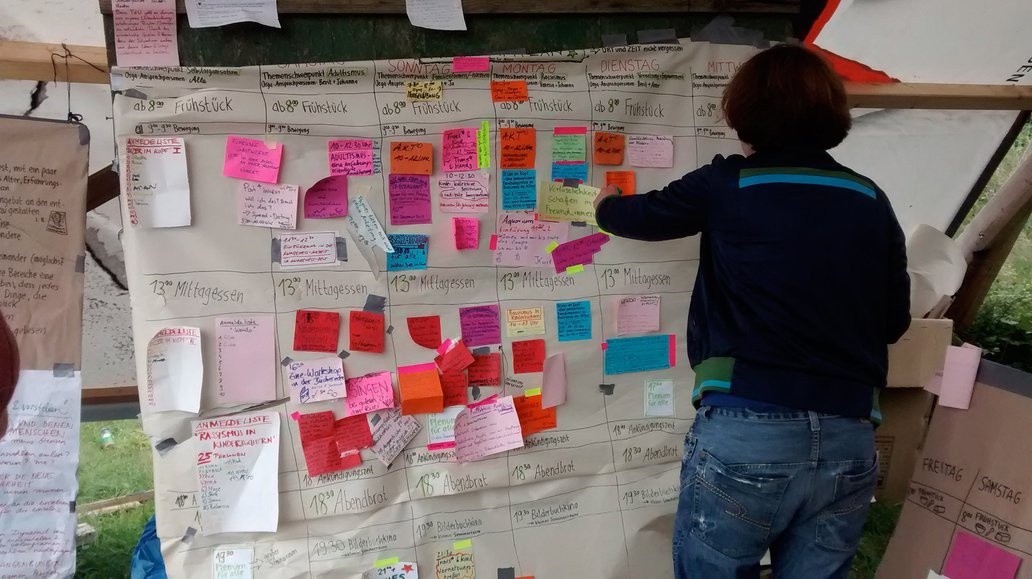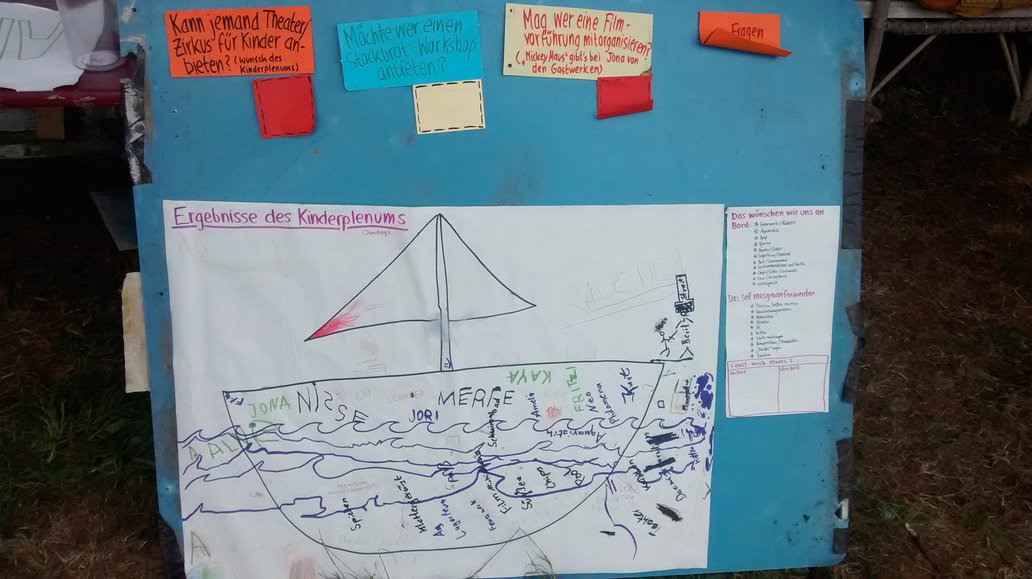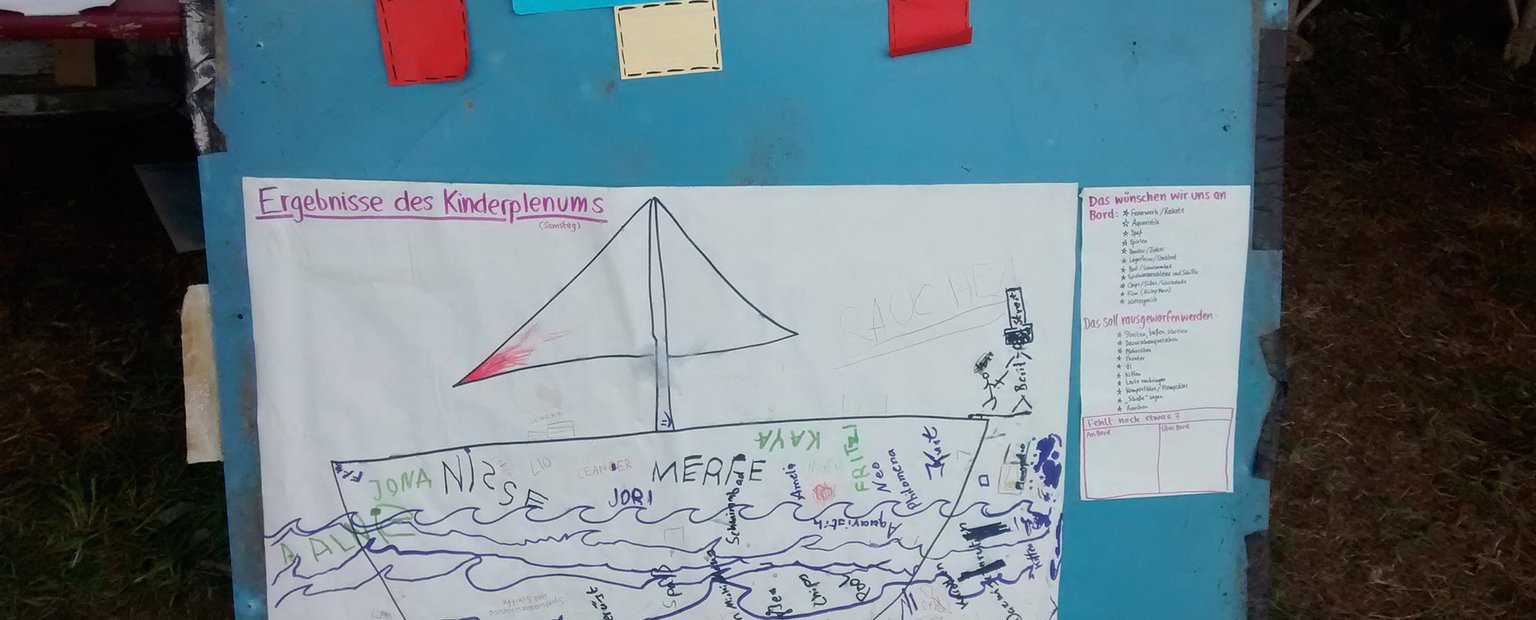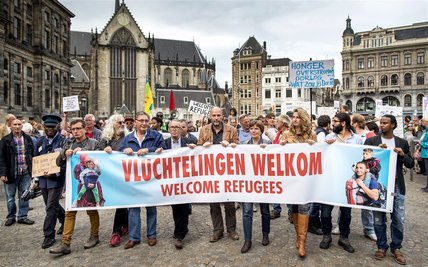The notion or buzzword “care” can be a fruitful and inspiring point of entry into central questions concerning the revolutionary potential of the commons. Not only is caring one of the basic needs which must be met in any society as part of a set of reproductive practices and arrangements, I believe that looking at care relations also opens up questions of what constitutes the revolutionary subject and their ethical relations today. What circumstances prompt us to care, how do we make this reproductive process happen, and what exactly does caring mean? In my master’s thesis
Commons that Care
- Feminist Interventions in the Construction of the Commons
I explore the topic of care from different angles, looking at oppressive care relations and whether there is radical, transformative potential to be found in alternative practices of care. To feed this kind of radical imagination I entered into a process of exchange and discussion with radical/anarchist parent activists. With their spaces that take the form of squats and autonomous social centers they strive to organize differently and remain independent from the norms and constraints of the market where care must be bought. They look for that same independence from Europe’s condition of a withdrawing welfare state, which increasingly serves no other purpose than to make people active members of the workforce. Caring is a devalued and feminized practice in society, and much of it is invisible. However, I found that if care is organized in common (outside of state and capital) within activist communities there is a potential to ask different questions about how we want to live together and what the commoner, the revolutionary subject can be. And maybe rethinking predominant models of how to organize caregiving within our communities is a backdoor through which new forms of struggle can be imagined.
Maybe rethinking predominant models of how to organize caregiving within our communities is a backdoor through which new forms of struggle can be imagined Deborah Sielert
Story 4 : Visions of unproductivity
Hanna’s story largely circled around a new “Hausprojekt” she just moved into with her partner and father of her child. Having experience with her activist community, I was very surprised by the positive experiences she had with them after her pregnancy. Although she and her partner are the main caregivers for their child, fellow activists and her political group are regularly willing to take responsibility for caregiving. We traced most of these positive experiences to the space of the Hausprojekt. Her six-month-old baby was present during our conversation; the interruptions made it a lot more difficult to concentrate but also enlivened the meeting. I think this is a perfect mirror of what happens when children become a visible part of activist (and other) spaces. Hanna concurred on the value of their involvement in saying, “I believe there is such a moment in which the child takes up a lot of space. Then the political discussion is not necessarily the focus anymore and everyone does things casually. In this case, I believe it becomes more relaxed and not so dogged because one is somehow a bit distracted.” Instead of only seeing the negative side of distraction, instead of mourning the loss of productivity through children’s presence at their meetings, Hanna developed a vision of how politics can look different. It was the experience of commoning childcare in her activist spaces that became vital. She says she wants to see politics become more serene or easygoing, and not be so verbissen [dogged], because she believes that would make “dealing with children and care activities easier in general.” Hanna’s reflection on moments of disruption or discontinuity within political processes is an important one in that it troubles a productivity ethos present in a lot of political groups. Working on the inclusion of different political subjects in communities takes time and space. And considering the disruptive moments in their transformative potential, rather than as interruptions, opens up possibilities to bring forth ideas of what living and struggling together can look like alternatively.
Commons are spaces from which to reclaim control over the conditions of our reproduction Silvia Federici
In January 2013 in Utrecht, the Netherlands, Marxist-feminist activist and teacher Silvia Federici gave a talk on commons as a form of anti-capitalist politics. For her, anti-capitalist commons have a double function. Firstly, they are “spaces from which to reclaim control over the conditions of our reproduction,” and secondly, these spaces can be a basis from which to struggle against processes of capitalist enclosure and continuing disentanglement from markets and from the state. It can be a basis for sustainable social movements and for experiments in living, cooperating, and struggling together differently. In this light I also follow researcher and cultural worker Manuela Zechner, who argues for the growing need to construct alternative caring networks. She asks: What experiments need to become possible? And what experience and tools-resources do we already have?
In my thesis I used the commoning of childcare as a more or less conscious form of including children in autonomous spaces which are often commons in which people meet to cook, learn, exchange, and plan and work on their struggles. I have been part of an activist camp and autonomous spaces of encounter in which different people struggle for a better life and these experiences have shaped me in profound ways. While the world might be dominated by either the public or private sphere, in these environments I saw that commoning is possible, and that it transformed the way I relate to people and motivated the energy and passion I have for my own struggles. All of these commoning experiences are always “only” experiments in living together differently, but they give us an idea of the possibilities involved in these alternatives.
This is why I set out to talk to a number of parent-activists in and around Utrecht, Hanover, and Berlin about how they practice and frame their experiences caring for children within activist spaces. The stories create a patchwork of what I encountered as a result of these discussions. Throughout the research phase of this project, I have repeatedly listened to reports about positive and recharging childcare practices in the participants’ anarchist and radical left movements. These have happened in contexts in which social reproduction is organized collectively for particular spaces —commons— even if only for a weekend activist camp.
Story 1 : Constructing commons as communities of care
Janneke became an activist through the Occupy movement, when her three children were already in their teens if not older. A grandchild was soon born. Becoming politically active had a lot of effects, positive and negative, on her relationship to her kids, and their kids. As she tends to jump into things headfirst and then become burnt out from the intensity of involvement, playing with her grandson and working in her veggie garden were important healing practices for her. While her house is an anarchist common she underlined that it is not some bubble disconnected from the rest of society. This is mostly due to the fact that one of her sons is still in school and lives with her. She told me why the construction of alternatives in living together, commons as I would call them, are especially dear to her.
In an argument with her son about her critique of the way the world is shaped, she told me that he “expressed it once in a very, very clear way. He said, ‘all this has destroyed my world, but I don’t have an alternative to it. I don’t see a different world yet. So all I see is what goes wrong, and there is no alternative.” It is her experience of commoning which triggered Janneke’s answer. Referring to squats and housing projects, she said, “I can tell them, yes there is an alternative, because I know a lot of people who do things in a different way.” In the same conversation she said, “So, I believe in the bubbles that arise everywhere, connected. And then if it grows bigger it grows bigger. If it doesn’t it doesn’t.” Staying in a collective housing project for some time also had an immediate effect on her health. While she managed to deal with her depression through therapy and mindfulness, she also told me, “there is a tiny bit that I am not able to solve myself, and for that tiny bit I need the medication. And if I stop taking the medication within one week I will be like ‘grrr’ [tense], this, all the time. And I noticed when I go to places like a camp or a squat and I stay there for a couple of days, I don’t need my medication.”

Imagination, understood as a process of developing capacities in order to envisage a different world, is, in the academic discourses I have encountered and researched, often associated with realms of aesthetics or faraway utopias. Amid the broader political public, general social movements that argue that “another world is possible” or slogans such as “let‘s be realistic, demand the impossible” are, as philosopher Chiara Bottici states, “easily labeled unrealistic, if not fanatical, and thus are excluded from the spectrum of viable political option.” In stark contrast, I find that in feminist and radical left communities, I am engaged in a long history of struggle and knowledge production against figurations of the present and for working toward the construction of autonomous spaces in which a different kind of existence can be practiced. I also find that the resources for this work are shared in horizontal, democratic ways in these spaces, even if this form of providing access doesn’t always bode for an entirely smooth process. Yet these are struggles for commons in and for social movements.
Story 2 : Devaluation of care as a feminized activity
I also heard stories about the difficulties and stumbling blocks encountered in actively involving children in parent-activist communities. One of them concerns the fact that childcare as a form of caregiving is feminized and devalued; it is seen as unimportant. Joop started the conversation on this subject in clearly stating a lot of frustration with respect to considering children within his movement experience. Childcare never seemed to be a topic, even in a magazine he was editing in the 1990s. Joop entered the autonomous scene in the Netherlands in the early 1980s and has been active since then. He has two children, a son who is already studying at the university and a toddler. In this sense he has, as he said himself, a sense for different activist generations and their interaction with children. He remembers an article he wrote for a radical left magazine in which he stated, “I’m not going to visit any squat bar anymore unless they make a children’s corner.” The reaction to this within the community was notable, he said. “Everybody thought it was very funny, which is telling, you know. I mean, it was meant to be funny, but the fact that it is considered funny is also a bit depressing.”
Hanna, who at the time of the interview just moved into a new collective house project (Hausprojekt) with her partner and her toddler mostly shared positive experiences she had with her community after the pregnancy. However, she also tells me, with an ironic undertone, that she often sees her fellow activists thinking: “I could write an immensely important text in the same amount of time.” She says the intellectual work of writing a text for the movement is considered a more important task, as an activist, than doing the dishes.
Lisa is also in the process of building up a huge housing project with her fellow activists. There is a lively and regular discussion on the topics of children and child-friendliness in that environment. In general, her (queer-feminist) community was supportive from the beginning, considering attempts to counter the gendered division of labor, for example, to be a high stakes measure. Lisa’s daughter Kim asked many questions and Lisa learned a lot from trying to explain to her what she thinks is the right answer. Experimenting with a childcare model that goes beyond the nuclear family was part of her life since she became pregnant. Of the project she said:
We are trying, in the project, to see this somehow equivalently. But in praxis, I would say, it has again another value for the people. That’s, for example, one of these things I see in Kim when she says, “Yes, but, Nele,” or whoever else, “she doesn’t do so much for the project.” I once answered, “But, well, she does take care of the kid or she sewed the swags for the backyard-fest.” It is already in the children’s heads, that sewing doesn’t have the same value as knocking down a wall. It is like that often, people talk about who carried heavy stuff upstairs or how great they were at using the drill. And a lot less about reproduction stuff.

Story 3 : Striving to relate through difference
Lisa said,
I ask myself sometimes . . . I am a bit unsure sometimes, if our forms of organizing, if that is adequate and right. And I am in a lot of exchange about this with other parents in the project. There actually were situations in which Kim [her daughter] said, yes, she wants a plenary as well, a children’s plenary. But there were also other parents in the project who thought that these are the kinds of forms in which grown-ups organize themselves and children might have totally different possibilities. And this need to make a plenary is, indeed, that they want to imitate and somehow, it’s a game... And not at all the way they negotiate their needs.
I myself have experienced a children’s plenary at an activist camp, in which the children not only voiced their wish to stop fighting and arguing with one another, but also to not have carrots in the food. They wanted to make bread on sticks in the fire, a theater workshop in the circus tent, and wished for more chips and chocolate. The plenary was led by an activist who has experience working with children in this context. What I find interesting is the way the facilitator presented the outcome of the plenary in the general meeting of the camp (because the children participants were too shy to talk). She seemed to have actively adjusted the content to accommodate what is accepted in or closer to an outcome of a similar meeting in a grown-up session. This means she left out some of the wishes of the children, namely all the ones concerned with chocolate and chips. I have concluded for myself that with a skilled facilitator, such a structure can work very well for children, but that it also is clear that the outcome of such a meeting can be, in many ways, different from and sometimes incompatible with the grown-up dominated structure, culture, and values of the camp. There seems to be a question at stake: How do we relate to others in respecting their difference and possibly radical alterity?
Silvia Federici and George Caffentzis, “Commons against and beyond capitalism,” Community Development Journal 49, no. S1 (January 2014): pp. 92–105.
Manuela Zechner, “A politics of network-families? Precarity, crisis and care,” in nanopolitics handbook, ed. Paolo Plotegher, Manuela Zechner, and Bue Rübner Hansen (New York: Minor Compositions, 2013), pp. 183–196.
Chiara Bottici, “Imaginal Politics: Images Beyond Imagination and the Imaginary” (Columbia University Press, 2014), p.1.
This article was published in the (Un)usual Business journal Utrecht Meent Het #1 (May, 2015).

